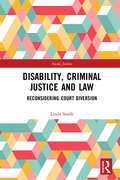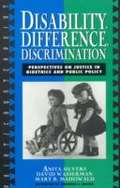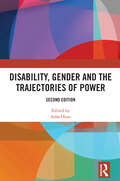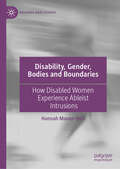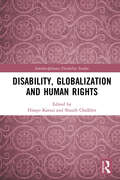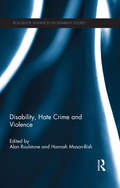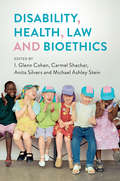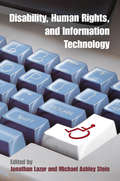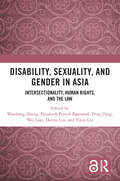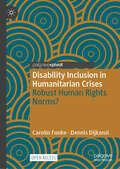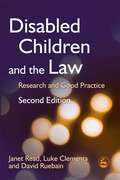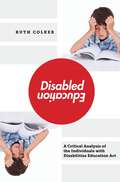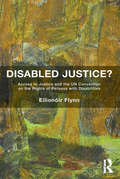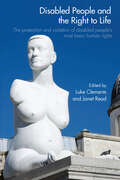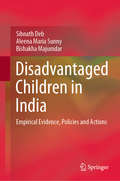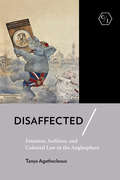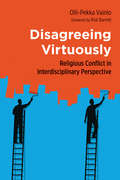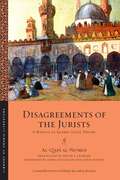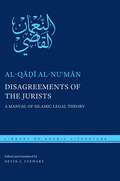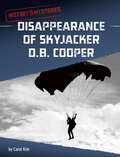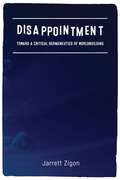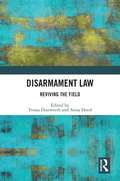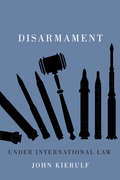- Table View
- List View
Disability, Criminal Justice and Law: Reconsidering Court Diversion (Social Justice)
by Linda SteeleThrough theoretical and empirical examination of legal frameworks for court diversion, this book interrogates law’s complicity in the debilitation of disabled people. In a post-deinstitutionalisation era, diverting disabled people from criminal justice systems and into mental health and disability services is considered therapeutic, humane and socially just. Yet, by drawing on Foucauldian theory of biopolitics, critical legal and political theory and critical disability theory, Steele argues that court diversion continues disability oppression. It can facilitate criminalisation, control and punishment of disabled people who are not sentenced and might not even be convicted of any criminal offences. On a broader level, court diversion contributes to the longstanding phenomenon of disability-specific coercive intervention, legitimates prison incarceration and shores up the boundaries of foundational legal concepts at the core of jurisdiction, legal personhood and sovereignty. Steele shows that the United Nations Convention on the Rights of Persons with Disabilities cannot respond to the complexities of court diversion, suggesting the CRPD is of limited use in contesting carceral control and legal and settler colonial violence. The book not only offers new ways to understand relationships between disability, criminal justice and law; it also proposes theoretical and practical strategies that contribute to the development of a wider re-imagining of a more progressive and just socio-legal order. The book will be of interest to scholars and students of disability law, criminal law, medical law, socio-legal studies, disability studies, social work and criminology. It will also be of interest to disability, prisoner and social justice activists.
Disability, Difference, Discrimination: Perspectives on Justice in Bioethics and Public Policy
by Anita Silvers David Wasserman Mary MahowaldThree philosophers and a physician address the impact of the 1990 Americans with Disabilities Act on what we think, personally and socially, about disability. The essays take differing positions on how justice for people with disabilities may be secured while addressing the ways in which the law has altered philosophical assumptions about people with disabilities. Themes include dependence, independence, and interdependence; normalcy and deviancy; fairness in allocating benefits and burdens; intrinsic or instrumental value; and Kantian concerns for human dignity and utilitarian concerns for aggregate welfare. Annotation c. Book News, Inc. , Portland, OR (booknews. com)
Disability, Gender and the Trajectories of Power
by Asha HansThis book explores the gendered experience of disability. It investigates how women with disabilities fare in society focusing on the experiences of women and their interactions with family, society and medical and legal institutions.Women with disabilities face unprecedented levels of violence, oppression and marginalisation in their daily lives as well as a lack of visibility, proper care and opportunities for socio-economic development. This book examines the reasons and consequences of the stigmatisation of disabilities and neurodivergence, denial of proper care, and various forms of exclusion and violence women with disabilities face both within and outside of their homes. It brings together the perspectives of academicians and activists that try and understand the various challenges faced by women with disabilities and highlights the fight for their right to autonomy, respect, equality, and justice. Filling the gap in the existing feminist research, this revised edition seeks to influence the way in which society treats women with disabilities and will be of interest to scholars and researchers in the field of women’s rights, disability rights, rehabilitation, social policy, and the body.
Disability, Gender, Bodies and Boundaries: How Disabled Women Experience Ableist Intrusions (Palgrave Hate Studies)
by Hannah Mason-BishThis book outlines the ways that disabled women experience unwanted touching and intrusive questions when navigating public space. Using the framework of feminist disability studies, this book takes an intersectional approach to fill a gap in the understanding of how disability and gender are factors in the nature and impacts of unwanted touching. It draws on research from over 70 women and non-binary people to elicit stories and examples, with some people living what some described as a ‘smaller life’. The methodology was a co-production with a disability activist. This book develops the new concept of Ableist Intrusions to investigate the nature and impacts of such experiences. It considers how non-disabled people should interact with disabled people in order to respect boundaries and bodies.
Disability, Globalization and Human Rights (Interdisciplinary Disability Studies)
by Hisayo KatsuiThe UN Convention on the Rights of Persons with Disabilities has facilitated the understanding that disability is both a human rights and development issue. In order to achieve the Sustainable Development Goals by 2030, the focus on disability inclusion has become increasingly important in the discourse of international and national efforts for "leaving no one behind", the motto of the SDGs. This book discusses pertinent and emerging themes such as disability rights, globalization, inequalities, international cooperation and representation. Evidence which has been obtained tends to show that persons with disabilities have been disproportionately left behind without proper representation, participation and inclusion. This book critically investigates the gaps at different levels, from top to bottom, and as importantly, within the global disability movement, for the realization of global disability rights, and theorizes the intersection of disability, globalization and human rights. Empirical case studies from different countries and contexts are introduced to deepen analysis on theories of critical disability studies from a global perspective. Co-edited by a disability researcher and the former United Nations Special Rapporteur on Disability, this book will be of interest to all students, academics, policy makers and practitioners working to advance the cause of disability rights around the world.
Disability, Hate Crime and Violence (Routledge Advances in Disability Studies)
by Alan Roulstone Hannah Mason-BishThis book provides a comprehensive and interdisciplinary examination of disability, hate crime and violence, exploring its emergence on the policy agenda. Engaging with the latest debates in criminology, disability and violence studies, it goes beyond conventional notions of hate crime to look at violences in their myriad forms as they are seen to impact upon disabled people’s lives. Despite a raft of relevant policy and legislation, few have attempted to draw together research on the disabled as victims of hate crime and violence. This innovative volume conceptualizes issues of disability, hate crime and violence and connects empirical research with theoretical insights. Making links between criminal justice policy, social care and welfare, it highlights areas of best practice and makes suggestions for policy and legislative reform. Disability, Hate Crime and Violence is written in accessible language, with minimal jargon and an international focus. Each chapter is grounded in research and practice, with relevant policy and legislation clearly signposted throughout. Disability, Hate Crime and Violence provides a much needed theoretical and practical investigation of the key issues around disabled hate crime and violence. It is an important work for students and academics researching and studying in disability studies, criminology, social policy and sociology, as well as those with an interest in domestic violence studies and broader historical and philosophical constructions of disability, violence and social harms.
Disability, Health, Law, and Bioethics
by Anita Silvers I. Glenn Cohen Michael Ashley Stein Carmel ShacharHistorically and across societies people with disabilities have been stigmatized and excluded from social opportunities on a variety of culturally specific grounds. In this collection, the authors explore the impact that the philosophical framing of disability can have on public policy questions, in the clinic, in the courtroom, and elsewhere. They examine the implications of this understanding for legal and policy approaches to disability, strategies for allocating and accessing health care, the implementation of the Americans with Disabilities Act, health care rights, and other legal tools designed to address discrimination. This volume should be read by anyone seeking a balanced view of disability and an understanding of the connection between the framing of disability and policies that have a real-world impact on individuals.
Disability, Human Rights, and Information Technology
by Michael Stein Jonathan LazarDisability, Human Rights, and Information Technology addresses the global issue of equal access to information and communications technology (ICT) by persons with disabilities. The right to access the same digital content at the same time and at the same cost as people without disabilities is implicit in several human rights instruments and is featured prominently in Articles 9 and 21 of the Convention on the Rights of Persons with Disabilities. <P><P>The right to access ICT, moreover, invokes complementary civil and human rights issues: freedom of expression; freedom to information; political participation; civic engagement; inclusive education; the right to access the highest level of scientific and technological information; and participation in social and cultural opportunities. <P><P>Despite the ready availability and minimal cost of technology to enable people with disabilities to access ICT on an equal footing as consumers without disabilities, prevailing practice around the globe continues to result in their exclusion. Questions and complexities may also arise where technologies advance ahead of existing laws and policies, where legal norms are established but not yet implemented, or where legal rights are defined but clear technical implementations are not yet established. <P><P>At the intersection of human-computer interaction, disability rights, civil rights, human rights, international development, and public policy, the volume's contributors examine crucial yet underexplored areas, including technology access for people with cognitive impairments, public financing of information technology, accessibility and e-learning, and human rights and social inclusion. <P><P>Contributors: John Bertot, Peter Blanck, Judy Brewer, Joyram Chakraborty, Tim Elder, Jim Fruchterman, G. Anthony Giannoumis, Paul Jaeger, Sanjay Jain, Deborah Kaplan, Raja Kushalnagar, Jonathan Lazar, Fredric I. Lederer, Janet E. Lord, Ravi Malhotra, Jorge Manhique, Mirriam Nthenge, Joyojeet Pal, Megan A. Rusciano, David Sloan, Michael Ashley Stein, Brian Wentz, Marco Winckler, Mary J. Ziegler.
Disability, Sexuality, and Gender in Asia: Intersectionality, Human Rights, and the Law
by Wanhong Zhang, Elisabeth Perioli Bjørnstøl, Peng Ding, Wei Gao, Hanxu Liu and Yijun LiuThis book introduces experiential knowledge of the intersectionality of disability, sexuality, and gender equality issues. Scholars and disabled persons’ organizations in different Asian countries such as China, Vietnam, Myanmar, Nepal, and Japan have contributed to the book. It is a preliminary introduction of the frontline practice of Asian disability activism and the experience of women and LGBTIQ people with disabilities. It presents the direct participation of disability advocates in mapping how both women with disabilities and LGBTIQ individuals with disabilities realize their rights such as identity, work rights, personal safety, and sexual rights. Studies presented here explore the experience of empowering diverse disability groups and advocating for equality and non-discrimination. It explains how to use the leverage of the Convention on the Rights of Persons with Disabilities (CRPD) for further human rights campaigns in a broader context for disadvantaged groups. This collection is the product of a participatory research project, which aims to increase the capabilities of local disabled persons’ organizations and NGOs in utilizing human rights laws and encourage dialogue and collaboration between academia, people with disabilities, and human rights advocates. It will be essential reading for academics, researchers, policy-makers, and campaign groups.
Disability, Society, and the Individual
by Julie SmartThis is a textbook in a graduate rehabilitation counseling program. It is for a class called psycho-social aspects of disability
Disability Inclusion in Humanitarian Crises: Robust Human Rights Norms? (Palgrave Studies in Disability and International Development)
by Dennis Dijkzeul Carolin FunkeThis open access book studies disability inclusion in humanitarian crises. It addresses the challenges of recognizing and including persons with disabilities and indicates the degree to which disability is being mainstreamed in international law and humanitarian action. Further, it explores how international organizations have promoted a rights-based understanding of disability in international law, and to what extent this understanding has gained acceptance in humanitarian policy and practice. Theoretically, Funke and Dijkzeul explore the robustness of the disability inclusion norm cluster during processes of institutionalization, translation, and implementation. The book examines these processes from a multi-level perspective, which involves a variety of actors beyond states, including organizations of persons with disabilities. Situating their analysis within the literature on humanitarian action and development, the authors argue for an increased focus on processes “below” the international level in international relations and international law scholarship to better understand disability inclusion.
Disabled Children and the Law: Research and Good Practice Second Edition
by David Ruebain Janet Read Luke ClementsNow in its completely updated second edition, this accessible guide provides essential information about how the law can be used to promote good practice and policy development for disabled children and young people. The authors take an anti-discriminatory and inclusive approach that involves parents and children in decision-making and advocacy. They summarise recent research on common needs and problems of disabled children, young adults and their families, and what support services are valued by them. Individual chapters cover issues affecting children at different stages in the lifecourse, including receiving diagnosis, ensuring educational and social inclusion, and establishing autonomy and independence in early adulthood. The overlapping legal responsibilities of social services, health and education are explained and changes arising from the Children Act 2004 are highlighted. Disabled Children and the Law is an essential reference for practitioners, policy makers, students and families.
Disabled Education: A Critical Analysis of the Individuals with Disabilities Education Act
by Ruth ColkerEnacted in1975, the Education for All Handicapped Children Act – now called theIndividuals with Disabilities Education Act (IDEA) provides all children withthe right to a free and appropriate public education. On the face of it, theIDEA is a shining example of law’s democratizing impulse. But is that reallythe case? In Disabled Education, Ruth Colker digs deep beneath theIDEA’s surface and reveals that the IDEA contains flaws that were evident atthe time of its enactment that limit its effectiveness for poor and minoritychildren.Both anexpert in disability law and the mother of a child with a hearing impairment,Colker learned first-hand of the Act’s limitations when she embarked on a legalbattle to persuade her son’s school to accommodate his impairment. Colker wasable to devote the considerable resources of a middle-class lawyer to herstruggle and ultimately won, but she knew that the IDEA would not havebenefitted her son without her time-consuming and costly legal intervention.Her experience led her to investigate other cases, which confirmed hersuspicions that the IDEA best serves those with the resources to advocatestrongly for their children. The IDEAalso works only as well as the rest of the system does: struggling schools thatserve primarily poor students of color rarely have the funds to provideappropriate special education and related services to their students withdisabilities. Through a close examination of the historical evolution of theIDEA, the actual experiences of children who fought for their education incourt, and social science literature on the meaning of “learning disability,”Colker reveals the IDEA’s shortcomings, but also suggests ways in whichresources might be allocated more evenly along class lines.
Disabled Justice?: Access to Justice and the UN Convention on the Rights of Persons with Disabilities
by Eilionóir FlynnDisability offers a new lens through which to view the effectiveness of access to justice, and the inclusiveness of the justice system as a whole. This book analyses the experience of people with disabilities through the entire justice system, from making a complaint, to investigation, and through the court/tribunal process. It also considers the participation of people with disabilities in a variety of roles in the justice system - as witness, defendant, complainant, plaintiff, lawyer, judge and juror. More broadly, it also critically examines the subtle barriers of access to justice which might exist in a given society - including barriers to grassroots disability advocacy, legal education and training, the right to vote and the right to stand for election which may apply to people with disabilities. The book is international and comparative in scope with a focus primarily on examples of legal practice and justice systems in common law countries. The work will be of interest to scholars working in the areas of human rights, equality and non-discrimination, disability rights activists and legal professionals who work with people with disabilities to achieve access to justice.
Disabled People and the Right to Life: The Protection and Violation of Disabled People’s Most Basic Human Rights
by Janet Read Luke ClementsThe most basic of human rights, the right to life, is the focus of this book. 'Human rights' has increasingly come to be seen as a significant framework, both to aid understanding of the experiences of those who face oppression, and to underpin social, legal and political measures to counter it. Disabled People and the Right to Life uses this framework to explore how disabled people’s right to life is understood in different national contexts and the ways in which they are – or are not – afforded protection under the law, emphasizing the social, cultural and historical forces and circumstances which have promoted disabled people’s right to life or legitimated its violation. Written by an international panel of contributors including individuals holding public office, academics from the fields of law, social policy, disability studies and bioethics as well as practitioners and activists attempting to further disabled people’s human rights, this truly interdisciplinary book will be of interest to students and researchers of disability, law, social policy and human rights.
Disadvantaged Children in India: Empirical Evidence, Policies and Actions
by Sibnath Deb Aleena Maria Sunny Bishakha MajumdarThis book addresses issues concerning five major categories of disadvantaged children, namely street children, children involved in trafficking, child labor, slum children, and children in institutional care, which apply to a large number of children around the world, including India. Compiling primary and secondary research-based evidences in addition to the first-hand experiences of the authors, it describes the link between social dynamics and the plight of disadvantaged children from both social and cultural perspectives. Each chapter includes examples and case studies to offer readers essential insights into the real-life situations of these children. At the end of each chapter, a number of evidence-based measures and models are proposed for agencies working to support disadvantaged children. Given its comprehensive coverage, the book is of interest to scholars, and government and non-government agencies involved in the welfare of disadvantaged children, funding agencies, and social science, medical and public health professionals.
Disaffected: Emotion, Sedition, and Colonial Law in the Anglosphere (Corpus Juris: The Humanities in Politics and Law)
by Tanya AgathocleousDisaffected examines the effects of antisedition law on the overlapping public spheres of India and Britain under empire. After 1857, the British government began censoring the press in India, culminating in 1870 with the passage of Section 124a, a law that used the term "disaffection" to target the emotional tenor of writing deemed threatening to imperial rule. As a result, Tanya Agathocleous shows, Indian journalists adopted modes of writing that appeared to mimic properly British styles of prose even as they wrote against empire. Agathocleous argues that Section 124a, which is still used to quell political dissent in present-day India, both irrevocably shaped conversations and critiques in the colonial public sphere and continues to influence anticolonialism and postcolonial relationships between the state and the public. Disaffected draws out the coercive and emotional subtexts of law, literature, and cultural relationships, demonstrating how the criminalization of political alienation and dissent has shaped literary form and the political imagination.
Disagreeing Virtuously: Religious Conflict in Interdisciplinary Perspective
by Olli-Pekka VainioDisagreement is inevitable, particularly in our current context, marked by the close coexistence of conflicting values and perspectives in politics, religion, and ethics. How can we deal with disagreement ethically and constructively in our pluralistic world? In Disagreeing Virtuously Olli-Pekka Vainio presents a valuable interdisciplinary approach to that question, drawing on insights from intellectual history, the cognitive sciences, philosophy of religion, and virtue theory. After mapping the current discussion on disagreement among various disciplines, Vainio offers fresh ways to understand the complicated nature of human disagreement and recommends ways to manage our interpersonal and intercommunal conflicts in ethically sustainable ways.
Disagreement (Key Concepts In Philosophy)
by Bryan FrancesRegardless of who you are or how you live your life, you disagree with millions of people on an enormous number of topics from politics, religion and morality to sport, culture and art. Unless you are delusional, you are aware that a great many of the people who disagree with you are just as smart and thoughtful as you are - in fact, you know that often they are smarter and more informed. But believing someone to be cleverer or more knowledgeable about a particular topic usually won’t change your mind. Should it? This book is devoted to exploring this quandary - what should we do when we encounter disagreement, particularly when we believe someone is more of an authority on a subject than we are? The question is of enormous importance, both in the public arena and in our personal lives. Disagreement over marriages, beliefs, friendships and more causes immense personal strife. People with political power disagree about how to spend enormous amounts of money, about what laws to pass, or about wars to fight. If only we were better able to resolve our disagreements, we would probably save millions of lives and prevent millions of others from living in poverty. The first full-length text-book on this philosophical topic, Disagreement provides students with the tools they need to understand the burgeoning academic literature and its (often conflicting) perspectives. Including case studies, sample questions and chapter summaries, this engaging and accessible book is the perfect starting point for students and anyone interested in thinking about the possibilities and problems of this fundamental philosophical debate.
Disagreements of the Jurists: A Manual of Islamic Legal Theory (Library of Arabic Literature #22)
by al-Qāḍī al-NuʿmānA masterful overview of Islamic law and its diversityAl-Qadi al-Nu'man was the chief legal theorist and ideologue of the North African Fatimid dynasty in the tenth century. This translation makes available for the first time in English his major work on Islamic legal theory (usul al-fiqh), which presents a legal model in support of the Fatimid claim to legitimate rule.Composed as part of a grand project to establish the theoretical bases of the official Fatimid legal school, Disagreements of the Jurists expounds a distinctly Shi'i system of hermeneutics. The work begins with a discussion of the historical causes of jurisprudential divergence in the first Islamic centuries and goes on to engage, point by point, with the specific interpretive methods of Sunni legal theory. The text thus preserves important passages from several Islamic legal theoretical works no longer extant, and in the process throws light on a critical stage in the development of Islamic legal theory that would otherwise be lost to history.An English-only edition.
Disagreements of the Jurists: A Manual of Islamic Legal Theory (Library of Arabic Literature #53)
by al-Qāḍī al-NuʿmānA masterful overview of Islamic law and its diversityAl-Qadi al-Nu'man was the chief legal theorist and ideologue of the North African Fatimid dynasty in the tenth century. This translation makes available in English for the first time his major work on Islamic legal theory, which presents a legal model in support of the Fatimids’ principle of legitimate rule over the Islamic community. Composed as part of a grand project to establish the theoretical bases of the official Fatimid legal school, Disagreements of the Jurists expounds a distinctly Shi'i system of hermeneutics, which refutes the methods of legal interpretation adopted by Sunni jurists. The work begins with a discussion of the historical causes of jurisprudential divergence in the first Islamic centuries, and goes on to address, point by point, the specific interpretive methods of Sunni legal theory, arguing that they are both illegitimate and ineffective. While its immediate mission is to pave the foundation of the legal Isma'ili tradition, the text also preserves several Islamic legal theoretical works no longer extant—including Ibn Dawud’s manual, al-Wusul ila ma'rifat al-usul—and thus throws light on a critical stage in the historical development of Islamic legal theory (usul al-fiqh) that would otherwise be lost to history.A bilingual Arabic-English edition.
Disappearance of Skyjacker D. B. Cooper (History's Mysteries)
by Carol KimOn November 24, 1971, a man boarded a passenger plane in Portland, Oregon. Later, he would become known as D. B. Cooper. But that wasn’t his real name, and he was no ordinary passenger. He hijacked the plane, demanded $200,000, and parachuted out of the plane with the money. He was never seen again. Who was D. B. Cooper, and what happened to him? Explore the theories behind this crime and why it has become one of history’s greatest mysteries.
Disappointment: Toward a Critical Hermeneutics of Worldbuilding
by Jarrett ZigonIncreasingly, anthropologists, political theorists and philosophers are calling for imaginative and creative analyses and theories that might help us think and bring about an otherwise. Disappointment responds to this call by showing how collaboration between an anthropologist and a political movement of marginalized peoples can disclose new possibilities for being and acting politically. Drawing from nearly a decade of research with the global anti-drug war movement, Jarrett Zigon puts ethnography in dialogue with both political theory and continental philosophy to rethink some of the most fundamental ontological, political and ethical concepts. The result is to show that ontological starting points have real political implications, and thus, how an alternative ontological starting point can lead to new possibilities for building worlds more ethically attuned to their inhabitants.
Disarmament Law: Reviving the Field
by Treasa DunworthThis volume seeks to start a revival of the field of disarmament law scholarship. Law is a fundamental component of disarmament, yet today, most perspectives on the wide range of disarmament issues that exist come primarily from political, diplomatic and public advocacy angles. The aim of this book is to revive the field of disarmament law building on earlier, important and still relevant contributions by international lawyers to the subject. The collection brings together international scholars on various aspects of disarmament. The contributions range across a variety of weapons types, adopt different approaches - doctrinal, historical and critical - to the issues being discussed and taken together, constitute a snapshot of the ideas, concerns and issues that currently occupy disarmament law scholars. The book will be essential reading for academics, researchers and policy-makers working in the area of disarmament.
Disarmament under International Law
by John KierulfRussia’s annexation of Crimea and involvement in the conflict in eastern Ukraine has in many respects set back post-Cold War improved relations between Russia, the United States, and Europe. The continued war in Syria threatens the security and stability of many countries in the Middle East and attacks by ISIS and other terrorist organizations are causing increased fear and instability in Iraq and in neighbouring countries. In many areas negotiations on disarmament and arms control are at a standstill. In Disarmament under International Law, John Kierulf examines and discusses how disarmament, arms control, and non-proliferation of both conventional weapons and weapons of mass destruction are regulated in existing treaties and conventions. From his perspective as a former disarmament negotiator, Kierulf explains the United Nations’ disarmament machinery and procedures, and describes the UN’s essential role in promoting disarmament. Underlining the continued and serious threat posed by nuclear weapons, Kierulf appeals for increased and effective international efforts to reduce their number and ultimately eliminate them. Presenting information and analysis on a comprehensive range of issues, Disarmament under International Law is an essential guide for anyone interested in gaining knowledge about the current state of international security.
